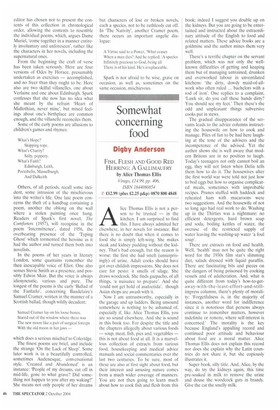Somewhat concerning food
Digby Anderson
FISH, FLESH AND GOOD RED HERRING: A GALLIMAUFRY by Alice Thomas Ellis Virago, £14.99, pp. 406, ISBN 1844080854 ,?.) £12.99 (plus £2.25 p&p) 0870 800 4848 Alice Thomas Ellis is not a person to be trusted — in the kitchen. I am surprised to find this. I have always admired her elsewhere, in her novels for instance. But there is no doubt that when it comes to food she is simply left-wing. She makes steak and kidney pudding without the kidney. That's had enough, but the reason is worse: the first she had smelt (unsurprisingly) of urine. Adult cooks should have got over childish impressions. She does not care for pesto: it smells of silage. She draws woodcock. She finds gazpacho, of all things, 'a nuisance to prepare'. And she 'could not get hold of asafoetida', though Asian shops are awash with it.
Now I am untrustworthy, especially in the garage and up ladders. Being unsound somewhere is nothing to be ashamed of, especially if, like Alice Thomas Ellis, you are so sound elsewhere. And she is sound in this book too. For despite the title and the chapters allegedly about various foods — soup, meat, fish, pies and, vegetables — this is not about food at all. It is a marvellous collection of extracts from various food, housekeeping and medical advice manuals and social commentaries over the last two centuries. To be sure, most of these are also at first sight about food, but their interest and amusing nature comes from a much wider coverage of manners. You are not then going to learn much about how to cook fish and flesh from this book; indeed I suggest you double up on the kidneys. But you are going to be entertained and instructed about the extraordinary attitude of the English to food and related matters. These advice books are a goldmine and the author mines them very well.
There's a terrific chapter on the servant problem, which was not only the wellknown difficulties of getting and keeping them but of managing untrained, drunken and overworked labour in unventilated kitchens: the dirty, dowdy maid-of-allwork who often ruled ... bachelors with a rod of iron'. One replies to a complaint, `Lawk sir, do you call these hands dirty? You should see my feet.' Then there's the odd and unpleasant things subversive cooks put in stews. The gradual disappearance of the servants leads to the advice columns instructing the housewife on how to cook and manage. Piles of fun to be had here laughing at the tone of the advisers and the incompetence of the advised. Yet the author shows she is well aware that modern Britons are in no position to laugh. Today's teenagers not only cannot boil an egg, they will not listen when Delia tells them how to do it. The housewives after the first world war were told not just how to boil eggs but how to organise complicated meals, sometimes with improbable recipes. Prunes stuffed with haddock and reheated ham with macaroons were two suggestions. And the housewife of not so long ago had real work to do. Washing up in the Thirties was a nightmare: no efficient detergents, hard brown soap and soda, boiling kettles of water, the overuse of the restricted supply of water leaving the washing-up water 'a foul soup'. There are extracts on food and health. Well, 'health' may not be quite the right word for the 1930s film star's slimming diet, salads dressed with liquid paraffin. There are fascinating bits and pieces on the dangers of being poisoned by cooking vessels and of adulteration. And, what is quite different from today's how-to-getaway-with-the-least-effort-and-stillimpress columns, there's plenty of morality: 'Forgetfulness is, in the majority of instances, another word for indifference since it is notorious that persons always continue to remember matters, however indefinite or remote, where self-interest is concerned.' The morality is the key because England's appalling record and continued poor attitude and behaviour about food are a moral matter. Alice Thomas Ellis does not explain this record nor does she explain why the Latin countries do not share it, but she copiously illustrates it.
Super book, silly title. And, Alice, by the way, do try the kidneys again, this time pre-soaked in milk to remove the urine and douse the woodcock guts in brandy. Give the cat the smelly milk.


















































































 Previous page
Previous page